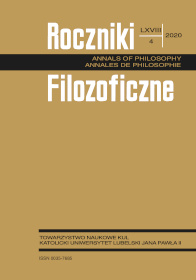Knowability as De Re Modality: A Certain Solution to Fitch Paradox
Abstract
In the paper, we try to find a new, intuitive solution to the Fitch paradox. We claim that traditional expression of Knowability Principle (p → ◊Kp) is based on erroneous understanding of knowability as de dicto modality. Instead, we propose to understand knowability as de re modality. In the paper we present the minimal logic of knowability in which Knowability Principle is valid, but Fitch Paradox does not hold anymore. We characterize the logic semantically as well as by an axiomatic and tableaux procedure approach.
References
Artemov, Sergei, Tudor Protopopescu. 2013. “Discovering knowability: a semantic analysis” Synthese 190, No. 16: 3349–76. DOI: 10.1007/s11229-012-0168-x.
Beal, J.C. 2000. “Fitch’s Proof, Verificationism, and the Knower Paradox.” Australasian Journal of Philosophy 78, No. 2: 241–47. DOI: 10.1080/00048400012349521.
Beal, J.C. 2009. “Knowability and Possible Epistemic Oddities.” In New Essays on the Knowability Paradox, edited by Joe Salerno, 105–25. Oxford: Oxford University Press. doi: 10.1093/ acprof:oso/9780199285495.003.0009.
van Benthem, Johan. 2009. “Actions That Make Us Know.” In New Essays on the Knowability Paradox, edited by Joe Salerno, 129–46. Oxford: Oxford University Press. doi: 10.1093/acprof:oso/9780199285495.003.0010.
van Benthem, Johan. 2004. “What one may come to know.” Analysis 64, No. 282: 95–105. doi: 10.1093/acprof:oso/9780199285495.003.0009
Brogaard, Berit, and Joe Salerno. 2008. “Knowability, Possibility and Paradox.” In New Waves in Epistemology, edited by Vincent F. Hendricks and Duncan Pritchard, 270–299. New York: Palgrave Macmillan.
Brogaard, Berit, and Joe Salerno. 2013. “Fitch’s Paradox of Knowability.” In The Stanford Encyclopedia of Philosophy, edited by Edward N. Zalta, https://plato.stanford.edu/archives/win2013/entries/fitch-paradox/, Metaphysics Research Lab, Stanford University, edition: winter 2013.
DeVidi, David, and Graham Solomon. 2001. “Knowability and Intuitionistic Logic.” Philosophia 28, No. 1-4: 319–34.
Dummett, Michael. 2001. “Victor’s Error.” Analysis 61, No. 1: 1–2. doi: 10.1093/analys/61.1.1.
Fagin, Ronald, Joseph Y. Halpern, Yoram Moses, and Moshe Y. Vardi. 1995. Reasoning about Knowledge. Cambridge, MA: MIT Press.
Fischer, Martin. 2013. “Some remarks on restricting the knowability principle,” Synthese 190, 16: 63-88. DOI 10.1007/s11229-010-9833-0.
Fitch, Frederic B. 2009. “A Logical Analysis of Some Value Concepts.” In New Essays on the Knowability Paradox, edited by Joed Salerno, 21–29. Oxford: Oxford University Press. DOI: 10.1093/acprof:oso/9780199285495.003.0003.
Fuhrmann, André. 2014. “Knowability as potential knowledge.” Synthese 191, No. 7: 1627–48. DOI: 10.1007/s11229-013-0340-y.
Goré, Rajeev. 1999. “Tableau systems for modal and temporal logics.” In Handbook of tableau methods, edited by Marcello D’Agostino, Dov M. Gabbay, Reiner Hähnle, and Joachim Posegga, 297–396. Dordrecht: Kluwer.
Jarmużek, Tomasz. 2013. “Tableau Metatheorem for Modal Logics.” In Trends in Logic. Vol. 41: Recent Trends in Philosphical Logic, edited by Roberto Ciuni, Heinrich Wansing, and Caroline Willkomennen, 103–26. Heidelberg, New York, Dordrecht, London: Springer International Publishing. doi: 10.1007/978-3-319-06080-4_8.
Kennedy, Neil. 2014. “Defending the Possibility of Knowledge.” Journal of Philosophical Logic 43, No. 2–3: 579–601. doi: 0.1007/s10992-013-9282-6.
Kooi, Barteld. 2016. “The Ambiguity of Knowability.” The Review of Symbolic Logic 9, No. 3: 421–28. DOI: 10.1017/S1755020315000416.
Kubyshkina, Ekaterina, and Dmitry V. Zaitsev. 2016. “Rational Agency From a Truth-Functional Perspective.” Logic and Logical Philosophy 25, No. 4: 499–520. doi:10.12775/ LLP.2016.016.
Kvanvig, Jonathan. 1995. “The Knowability Paradox and the Prospects for Anti-Realism.” Nous 29, No. 4: 481-500. doi: 10.2307/2216283.
Kvanvig, Jonathan. 2006. The Knowability Paradox. Oxford: Oxford University Press.
Maffezioli, Paolo, Alberto Naibo, and Sara Negri. 2013. “The Church-Fitch knowability paradox in the light of structural proof theory.” Synthese 190, No. 14: 2677–716. doi: 10.1007/ s11229-012-0061-7.
Meyer, John Jules Ch. 2001. “Epistemic Logic.” In Blackwell Guide to Philosophical Logic, edited by Lou Gouble. Oxford: Blackwell Publishing.
Meyer, John Jules Ch., and W. van der Hoek. 1995. Epistemic Logic for AI and Computer Science. Cambridge: Cambridge University Press.
Nelson, Michael. 2019. “The De Re/De Dicto Distinction. Supplement to Propositional Attitude Reports.” In The Stanford Encyclopedia of Philosophy, edited by Edward N. Zalta, https://plato.stanford.edu/entries/prop-attitude-reports/dere.html, Metaphysics Research Lab, Stanford University, edition: spring 2019.
Palczewski, Rafał. 2007. “Distributed Knowability and Fitch’s Paradox.” Studia Logica 86, No. 3: 455–78. DOI:10.1007/s11225-007-9070-9.
Pietruszczak, Andrzej, and Tomasz Jarmużek. 2018. “Pure modal logic of names and tableau systems.” Studia Logica 106, No. 5: 1261–89. doi: 10.1007/s11225-018-9788-6.
Priest, Graham. 2009. “Beyond the Limits of Knowledge.” In New Essays on the Knowability Paradox, edited by Joe Salerno, 93–104. Oxford: Oxford University Press. doi: 10.1093/ acprof:oso/9780199285495.003.0008.
Proietti, Carlo. 2012. “Intuitionistic Epistemic Logic, Kripke Models and Fitch’s Paradox.” Journal of Philosophical Logic 41, No. 5: 877-900. doi: 10.1007/s10992-011-9207-1.
Proietti, Carlo. 2016. “The Fitch-Church Paradox and First Order Modal Logic.” Erkenntnis, 81, No. 1: 87–104. doi: 10.1007/s10670-015-9730-5.
Salerno, Joe. 2009. “Knowability Noir: 1945–1963.” In New Essays on the Knowability Paradox, edited Joe Salerno, 29–48. Oxford: Oxford University Press.
Tennant, Neil, Revamping the Restriction Strategy, in: New Essays on the Knowability Paradox, ed. Salerno J., Oxford University Press, Oxford, 2009, pp. 223–38. doi: 10.1093/acprof:oso/ 9780199285495.003.0015.
Tennant, Neil. 1997. The Taming of the True. Oxford: Oxford University Press.
Wansing, Heinrich. 2002. “Diamonds Are A Philosopher’s Best Friends. The Knowability Paradox and Modal Epistemic Relevance Logic.” Journal of Philosophical Logic 31: 591-612. doi: 10.1023/A:102125651.
Williamson, Timothy. 1982. “Intuitionism Disproved?” Analysis 42: 203–207. doi: 10.1093/ analys/42.4.203
Williamson, Timothy. 1992. “On Intuitionistic Modal Epistemic Logic.” Journal of Philosophical Logic21: 63–89. doi: 10.1007/BF00126497.
Williamson, Timothy. 2000. Knowledge and Its Limits. Oxford: Oxford University Press.
Zemach, Eddy M. 1987. “Are There Logical Limits For Science?” The British Journal for the Philosophy of Science 38, No. 4: 527–32. doi: 10.1093/bjps/38.4.527.
Copyright (c) 2020 Roczniki Filozoficzne

This work is licensed under a Creative Commons Attribution-NonCommercial-NoDerivatives 4.0 International License.





